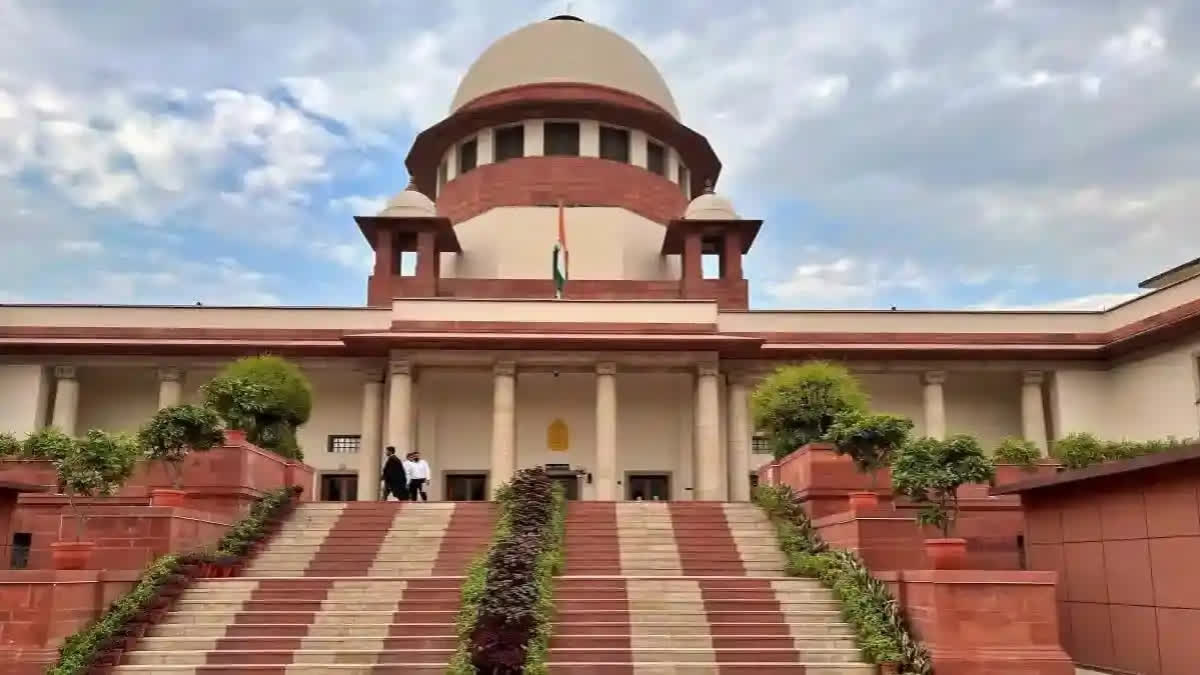New Delhi:The Supreme Court will deliver a judgment on Thursday on a plea for reconsideration of its 2018 judgment, which ordered for automatic vacation of stay in all civil and criminal matters after a six months period.
The apex court, in 2018, had held that the stay granted by a lower court or high court in civil and criminal cases will automatically expire after six months unless extended specifically. While reserving the judgment on December 13, 2023, a constitution bench led by Chief Justice of India D Y Chandrachud orally observed that the automatic vacation of stay prejudices the litigant irrespective of the conduct of that litigant, while reserving its verdict on a plea seeking reconsideration of its 2018 judgment.
The bench, also comprising Abhay S Oka, J B Pardiwala, Pankaj Mithal and Manoj Misra, had reserved the judgment on the petitions filed by the High Court Bar Association Allahabad and others.
During the hearing, the CJI stressed on two problems arising from the automatic vacation of stay orders. The CJI said: One, the automatic vacation of stay prejudices the litigant irrespective of the conduct of that litigant and there are circumstances over which a litigant has no control. Second, the vacation of an order of stay is also a judicial act and it is not an administrative act.
Senior Advocate Rakesh Dwivedi, representing the High Court Bar Association of Allahabad, had argued against the automatic vacation of stay orders and stressed that such a mechanism could interfere with the constitutional structure, particularly Article 226, and may be seen as judicial legislation. He suggested creating separate benches to consider extensions, while citing the importance of a nuanced approach to different case types. Dwivedi cited delay in court proceedings, specifically in certain High Courts such as the Allahabad High Court and the Patna High Court.
The bench observed that is also what weighed with the judges, otherwise, stay just continues for decades, particularly in larger high courts. Dwivedi pointed out that delays in legal proceedings are often exacerbated when accused individuals secure interim orders, taking advantage of the situation. The CJI observed that the issue stemmed not because of fault of individual judges but it is a consequence of the sheer volume of cases, making it practically impossible to address every matter on the docket promptly.
Solicitor General Tushar Mehta highlighted instances where contempt cases were filed against judges, for not resuming trials on the strength of Asian Resurfacing, particularly in states like Punjab and Haryana.
Mehta concurred with Dwivedi and said the judicial discretion of high courts cannot be curtailed by a “judicial mandamus or a continuing mandamus”. On December 1, the Supreme Court expressed reservations with its 2018 judgment on the 'Asian Resurfacing case'. The judgment had ordered that there would be automatic lifting of stay in all civil and criminal matters upon expiry of six-month time.
The bench said, in its order, said: “The principle which has been laid down in the above decision to the effect that the stay shall automatically stand vacated (which would mean an automatic vacation of stay without application of judicial mind to whether the stay should or should not be extended further) is liable to result in a serious miscarriage of justice”.
The court said since the previous judgment was passed by a three-judge bench, the matter is required to be reconsidered by a five-judge bench and indicated the matter would be listed on an early date. The previous judgment in case of 'Asian Resurfacing of Road Agency Vs CBI' was delivered on March 28, 2018 by a bench of Justices Adarsh Kumar Goel, R F Nariman and Navin Sinha (all since retired).
Read More
- CJI Chandrachud Welcomes 4 New SC Judges with an Advice: 'Legal Power Not Enough, Stronger Tool is...'
- SC Junks Plea against Rajasthan Govt Rule Debarring Candidates with More Than 2 Children
